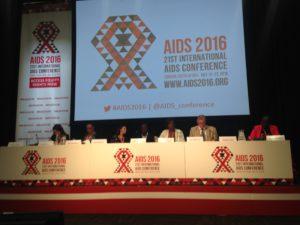 The 21st International AIDS Conference (AIDS 2016) kicked off yesterday in Durban, South Africa with nearly 20 000 delegates from across the globe.
The 21st International AIDS Conference (AIDS 2016) kicked off yesterday in Durban, South Africa with nearly 20 000 delegates from across the globe.
On Tuesday July 19th, the conference held a vaccine symposium that addressed the latest research and progress on HIV vaccines and antibody prophalixis trials in southern Africa. The session was led by medical virologist at the University of Cape Town, Wendy Anne Burgers, and member of the National Institute of Allergy and Infectious Disease, Carl W. Dieffenbach. Presenters included Fatima Laher, Nyaradzo Mavis Mgodi, Anthony Fauci, and Nicole Fram.
Fatima Laher from the P5 study (PoxProtein Public Private Partnership) discussed the diverse methods that the organization is using to build on the success of the Rv144 Thai vaccine trial. The goal of this partnership is to prolong the efficacy by testing various boosters to increase the antibody response. Research trials are currently underway in both Southern Africa and Thailand.
Nyaradzo Mavis Mgodi presented a new approach for HIV vaccine. Antibody Mediated Prevention (AMP) study differs from other vaccine studies in that it provides antibodies to patients rather than the body making the antibody itself. The antibody uses a manufactured antibody called VR01 which has shown exceptional results in nonhuman studies by fully protecting primates against rectal and vaginal infections. Mgodi stated, “Vr01 will teach us the amount of the antibody a vaccine may need to protect HIV”. Clinical trials are currently being conducted throughout America, Brazil, Peru and seven sub sharan countries.
Anthony Fauci received the recipient of the IAS Presidents’ Award for his dedication to HIV vaccine research. Optimistic about the potential of a HIV vaccine, Fauci ended the session by stating, “A vaccine for HIV is possible […] The development of a vaccination will require both an empiric and theorectical approach. Broadly neutralizing antibodies will play an important, but certainly not an exclusive role”.
